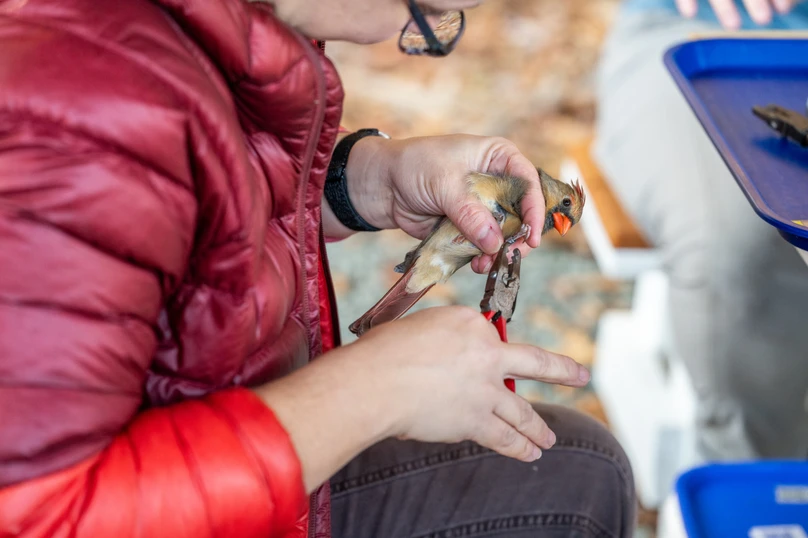PROTECT YOUR DNA WITH QUANTUM TECHNOLOGY
Orgo-Life the new way to the future Advertising by AdpathwayThis story was originally published at High Country News and is republished here by permission.
Donna Graves couldn’t believe it when she heard that the LGBTQ+ exhibit she created at the Rosie the Riveter/WWII Home Front National Historic Park in Richmond, California, was in jeopardy. Walking through the airy brick building in mid-June, a former World War II factory turned visitor center, she stopped in front of the exhibit’s three tall free-standing signs. One of them read “Changing History” in big, bold letters on top. Sunlight streamed through the windows behind them, while the sound of archival newsreels wafted over from the next room.
Graves, a historian, helped found this national historical park, which focuses on Americans’ involvement in the WWII war effort, 25 years ago. The visitor center opened in 2012, and in 2016 Graves added this exhibit, telling the stories of queer people in the Bay Area during the war. Though homosexuality was illegal, queer folks found ways to be themselves, even if they had to live under the radar. “It was, as far as we know, the first permanent exhibit on LGBTQ history at a national park,” Graves said. The exhibit includes an old advertisement for Finocchio’s, a popular drag club in San Francisco, and a more recent photo of a Pride parade, with marchers holding a banner paraphrasing a famous Martin Niemöller quote: “The Nazis first came for the Jews and I said nothing.”
In January, President Donald Trump issued executive orders dismantling diversity, equity and inclusion programs and banning the use of the word “transgender” in federal communications. Fearing the visitor center would be seen as in violation of these orders, a Rosie the Riveter staffer quietly took down the LGBTQ+ exhibit. Word about this reached Graves, and after she got over her disbelief, she got angry. She and others made their concerns known to staff, who put the exhibit back up a few days later.
“It was, as far as we know, the first permanent exhibit on LGBTQ history at a national park.”
But it was only the first time the Trump administration issued directives about how national parks communicate history. Now there’s a sign on the counter near the museum entrance and gift shop inviting visitors to report any “negative” information they see presented. All national parks were required to post these signs by June 13 and staff must review and evaluate each piece of feedback. National parks must also report any content that “inappropriately disparages” Americans to the Department of the Interior by July 18. (In a statement, the Department of the Interior said the order is a step toward ensuring history presented at places like national parks is “free from ideological distortion” and that the goal is “not to erase history but to correct inaccuracies and omissions, ensuring that all Americans are represented fairly and truthfully.”)
But it was only the first time the Trump administration issued directives about how national parks communicate history. Now there’s a sign on the counter near the museum entrance and gift shop inviting visitors to report any “negative” information they see presented. All national parks were required to post these signs by June 13 and staff must review and evaluate each piece of feedback. National parks must also report any content that “inappropriately disparages” Americans to the Department of the Interior by July 18. (In a statement, the Department of the Interior said the order is a step toward ensuring history presented at places like national parks is “free from ideological distortion” and that the goal is “not to erase history but to correct inaccuracies and omissions, ensuring that all Americans are represented fairly and truthfully.”)
For years, Graves has worked with the National Park Service to share the rich diversity of American stories, even those parts of U.S. history that could be seen as “negative.” The Rosie the Riveter park tells how the U.S. came together to fight in WWII but also how some Americans faced discrimination from their own government, including how Black Americans could only hold certain jobs and Japanese Americans were incarcerated after the Pearl Harbor bombing. It was important to Graves to tell these stories not just because they are factual, but also so that all Americans could see themselves reflected in the nation’s history. That wouldn’t be possible under these new policies, Graves said.
Positive reports only
Bay Nature reviewed all submissions made in response to the federally-mandated signs in national parks within the greater Bay Area. The information was obtained by the National Parks Conservation Association. Nearly everyone used the sign’s call for “negative” information as a moment to praise national parks. One visitor wrote, “The problem with the Presidio is that there is simply too many things to do.”
Other commenters praised the community outreach in Golden Gate National Recreation Area, the opportunities for camping, and the access to native plants and wildlife. A visitor to Pinnacles requested more information about California condors, geology, and Indigenous history. In Yosemite, a visitor wrote, “Honesty, truths, and facts are truly the values I demand when seeking out national parks. Without that, everything is just a pretty facade with no real substance.”—Bay Nature staff
 Sand Creek Massacre National Historic Site in Kiowa County, Colorado. Courtesy of the National Park Service.
Sand Creek Massacre National Historic Site in Kiowa County, Colorado. Courtesy of the National Park Service.The way the National Park Service presents history has evolved over the last few decades. At Civil War sites like Gettysburg National Military Park in Pennsylvania, the Park Service shifted from giving a blow-by-blow account of battles to addressing slavery as a root cause of the war. It acquired new sites such as Sand Creek Massacre National Historic Site in Colorado, where American soldiers ambushed and murdered hundreds of Arapaho and Cheyenne civilians, and Cesar Chavez National Monument in California, which honors leaders in the struggle for farmworker rights.
“These are complicated issues, but it’s all a part of our shared national narrative,” said Alan Spears, the senior director for cultural resources at the National Parks Conservation Association. And if the highest levels of government refuse to talk about it, “then we are basically ignoring the stories of a significant part of the population. And I actually think I would go so far and be so bold as to say I feel like that’s a civil rights violation.”
Spears said asking visitors to inform on interpretive rangers could be seen as harkening back to more restrictive times, such as when the government investigated people for being associated with communism. “Are you now or have you ever been a historian?” he quipped. Spears said he is worried about a chilling effect from the new policies, but, he added, “I also know that there are some people in the National Park Service who are committed to maintaining truth, accuracy and inclusion.”
“These are complicated issues, but it’s all a part of our shared national narrative.”
Bay Nature’s email newsletter delivers local nature stories, hikes, and events to your inbox each week.
Sign up today!

Indeed, park staff across the country are finding ways to resist. Over a thousand off-duty park rangers have formed an ad hoc group called the Resistance Rangers, which organizes protests in person and on social media and is archiving park websites that are being edited to remove references to queer and trans people and climate change. The group communicates on an encrypted texting app, with members often using only their initials — a level of security more typically associated with political activists than people whose day jobs include giving campfire programs about the night sky.
Many people who work for the Park Service are eager to talk, though not on the record. Rangers report feeling sad or angry about having to outwardly comply with recent orders. However, those orders also leave room for interpretation, and many staffers are taking advantage of this. “An important thing I’ve learned is that in the federal government, you only take action when you’re directed to,” one interpretive ranger in the Bay Area told me, speaking on condition of anonymity to protect their job. “I can’t spend time worrying,” the ranger said, especially amid deep staffing and budget cuts. “There are literal emergencies, like people getting lost. I’m grateful I don’t have to waste my time parsing out these convoluted directives that have not been thought through.”
 The entrance to Rosie the Riveter/WWII Home Front National Historic Park in Richmond, California. Courtesy of Bill Abbott/CC via Flickr.
The entrance to Rosie the Riveter/WWII Home Front National Historic Park in Richmond, California. Courtesy of Bill Abbott/CC via Flickr.The most important thing to the Bay Area ranger is continuing to help people connect to these places. “There’s a unique privilege to being one of the ‘storytellers of America.’” they said. At this time, their park unit isn’t removing any exhibits that might be deemed “negative,” and it is continuing to deliver its programs, although workers are being strategic in what they promote online. “I try to balance what it means to be visible and do the work,” the ranger said.
A few weeks after Rosie the Riveter staff put the LGBTQ+ exhibit back up, Graves was visiting the center and saw an older man reading the signs and looking at the photos for quite some time. “I finally went up to him and said, ‘You look so interested in this,’” Graves said. “And he said, ‘Well, I better be. I have one kid who’s trans and one who’s gay.’” Graves thought, what if the signs had still been down? And he hadn’t been able to read those stories and feel a connection to his own children? “That really moved me,” she said.
Graves said that what happened at Rosie the Riveter is ultimately a hopeful story. “The community said, ‘This is important to us.’ And park leadership said, ‘We’re going to put it back up.’” But as federal directives continue to play out, the future of the LGBTQ+ exhibit is unclear.


 1 day ago
15
1 day ago
15





















 English (US) ·
English (US) ·  French (CA) ·
French (CA) ·